What is SSC- Staff Selection Commission
SSC, also known as Staff Selection Commission. It is the Government of India's staff selection committee, an agency for recruitment in different positions in several Indian Ministries, Government Departments, and in subordinate offices. It is one of the most renowned, eminent governmental organisations that aid in the recruitment process in the country.
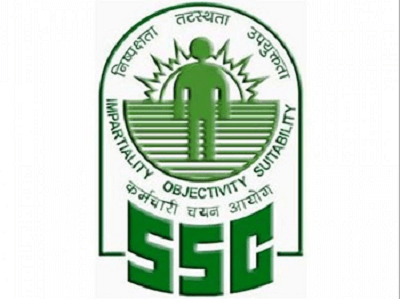
This committee is a collaborative office of the Department of Personnel and Training consisting of the Chairman, two Members, and one Examination Controller(who is also serving as the Secretary). His post is equal to the Government of India's additional secretary.
In the 47th report (1967–68), the Parliamentary Estimates Committee advocated establishing a Service Selection Commission. This (1967–68) report suggested that the formation of SSC can help uphold the assessment or examination for the recruitment of lower categories of positions. Later, on 4 November 1975, the Indian government formed a commission titled the Subordinate Service Commission at the Department for Personnel and Administrative Reforms. The Subordinate Service Commission was later titled as Staff Selection Commission on 26 September 1977.
On May 21, 1999, the Government of India, through the Personnel Ministry, the Public Grievances, revised the functions of the SSC. Afterward, the SSC's changed or modified constitution commenced to be in usage from 1 June 1999. SSC undertakes the SSC Combined Graduate Level Examination to recruit non-gazetted officers for various positions each year.
At present, SSC is headed under the chairmanship of Braj Raj Sharma. Moreover, Staff Selection Commission is centered in New Delhi, India.
In addition, the SSC also has a zonal system in place for conducting and seamless examinations. Currently, it has 7 Regional Offices in Allahabad, Mumbai, Kolkata, Delhi, Chennai, Guwahati, Bangalore, and two Sub Regional Offices in Raipur and Chandigarh.
SSC is efficient in conducting competitive exams to hire different services and positions. There are around 20 various kinds of occupations between groups B and C. The eligibility condition essential for applying for an SSC exam is graduation in any programme from an acknowledged university. Some posts, such as the Sub-Inspector and Narcotics Department, in addition to graduation, also demand good physical health and specific measurements.
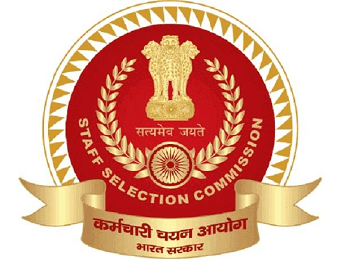
Core Roles and Functions of SSC
Some of the roles, responsibilities of the Staff Selection Commission include;
- Conducting and managing employment for Group 'B' roles in Indian ministries/departments and subservient offices, as well as all non-technical Group 'C' positions inside Indian ministries or departments along with their subordinate offices
- To perform exams and interviews seamlessly in their area of responsibility.
- To arrange departmental examinations for promotion from a lower to a higher division.
- To upheld regular examinations for Hindi and English type-writing
- Must carry out other essential roles, duties, and responsibilities given to them from period to period by Central Govt.
Examinations Upheld by SSC
The SSC now serves as the Department of Personnel and Training's subsidiary office and is primarily involved in directing competitive recruitment exams for different positions in several departments. SSC has held several examinations in the past years, as shown below.
The exams upheld by SSC include;
- SSC Combined Graduate Level Examination (SSC CGL)
- SSC Combined Higher Secondary Level Exam (SSC CHSL)
- Junior Engineer
- Junior Hindi Translator
- SSC GD Constable
- SSC Multitasking Staff
- Selection Post
- SI (Central Police Organization)
- Stenographer C & D
Staff Selection Commission- Minimum Qualification
SSC also conducts exams for the lower posts and divisions, so the qualification for those posts don't require graduation.
The minimum qualification to appear in SSC is;
- All candidates must have the basic minimum eligibility to qualify for the examinations. The required minimum qualification is from the 10th pass to being a graduate.
Now let us have a look at each examination that is conducted by SSC, along with its detailed requirement, process, and job positions that are offered by them;
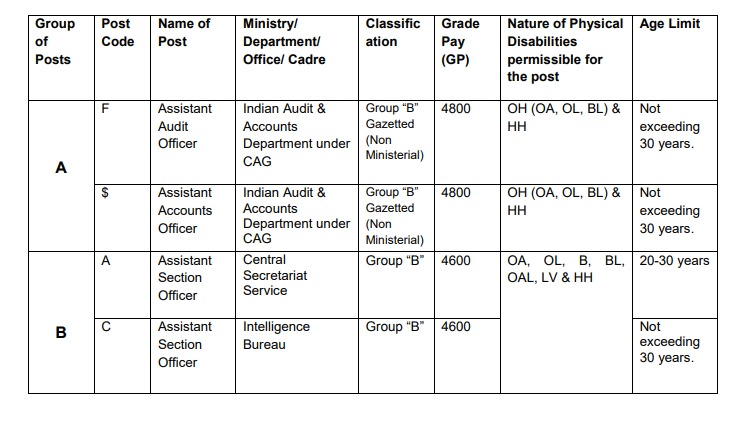
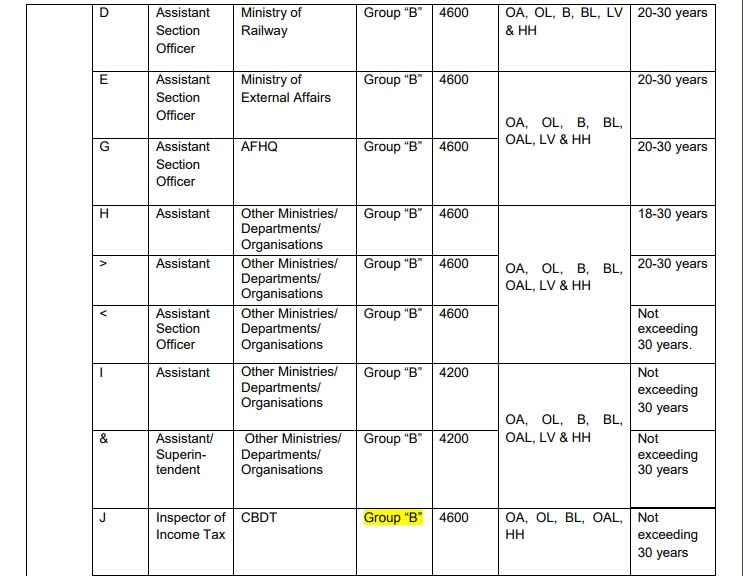
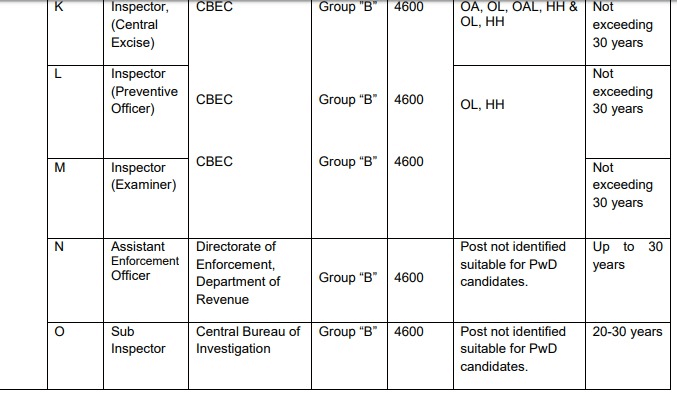
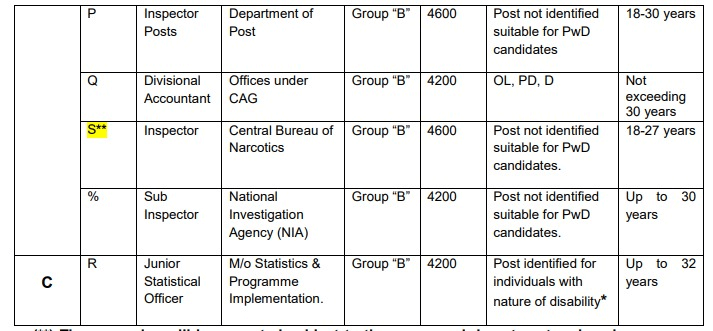
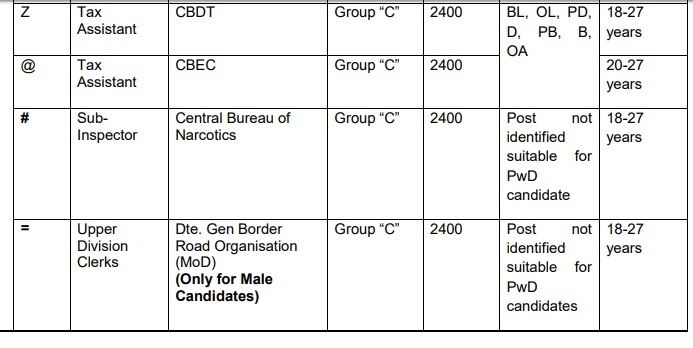
SSC CGL or Combined Graduate Level Examination
The combined graduate level examination is a full form of CGL. Annually, SSC conducts the CGL Exam to hire people to various roles within various government departments, government departments, and organisations. There are several educational prerequisites to enroll for this renowned exam.
It includes;
A degree from a recognised university is the minimum educational qualification. When the SSC CGL examination is completed, a candidate is recruited for different positions in Group B and Group C.
The following are the different positions of SSC CGL Group B:
- Assistant Audit Officer
- Assistant Section Officer
- Assistant/ Superintendent
- Inspector of Income Tax
- Inspector, (Central Excise)
- Inspector (Preventive Officer)
- Inspector (Examiner)
- Assistant Enforcement Officer
- Sub Inspector
- Inspector Posts
- Divisional Accountant
- Inspector
- Sub Inspector
- Junior Statistical Officer
However, there are certain exceptions; for example, in 2018, the job post for the Central Bureau Inspector of Narcotics, that previously was available for individuals aged 18 to 27, was expanded to 30 years. Whereas Rs. 100 is the application fee for the examination. All women applicants who are qualified for the examination are excused from paying the applications fee along with Scheduled Caste, Scheduled Tribe, Physically Disabled, and Ex-Servicemen.
Structure of the Examination
The exam is performed over numerous Tiers over several days, and after each Tier, results are posted on the respective website. Earlier examinations also included a level of interviews; however, interviews for all non-gazetted Central Government jobs were dispensed from 2016 based on a government directive.
Certain jobs apart from the other tiers also require a computer expertise test or a talent test. The exam consists of four main levels.
Tier I, which is also known as the Preliminary
The Tier I test comprises of a multiple-choice written objective question with multiple options(mainly 4)including:
- General Intelligence and Reasoning
- General Awareness
- Quantitative Aptitude
- English Comprehension
The test is usually scored at a total of 50 marks for each segment for 200 marks in total. The most recent editions of this review have been carried out online, for instance, with 2018. The Tier II and Tiers III tests are then performed by the individuals who pass based on Tier I results.
Tier II: Mains Exam
The Tier II exam, often known as the Mains exam. It is a written objective multiple-choice examination made up of four segments or Paper encompassing the topics ;
- Quantitative Aptitude
- English Language and Comprehension
- Statistics
- General Studies, that has sub- divisions:
- Finance & Accounting
- Economics & Governance.
The examination includes 200 marks for each section.
Most roles require the applicant to merely take the first two papers (Paper I: Quantitative Aptitude; Paper II: English language and comprehension). Only a few want the third or fourth segment.
Tier III: Descriptive Paper
Tier 3 includes an Offline exam - with pen and paper where applicants have to write the essay, letter, and precis and application. Any language may be selected as the applicant can select English language or Hindi.
Tier IV: Computer Skill Test / Data Entry Skill
These two exams are taken according to the roles that require these sets of exams or evaluations.
Additional tests
For specific occupations, additional examinations are required. These include
- Interview (discontinued starting 2016)
- Physical Fitness Test which is required for posts like
- Central Police Organization (CPO)
SSC CHSL or Combined Higher Secondary Level Exam
The Combined Higher Secondary Level Exam is often abbreviated as CHSL. The SSC conducts (CHSL) Examination every year to choose applicants for several positions in many departments, ministries, etc. Applicants or prospective employees are invited for the posts of Lower Divisional Clerical posts (LDC)/ Junior Secretariat Assistants (JSA) positions, Post Assistants (PA)/ Sorting Assistants (SA) position, Data Entry Operators (DEO), and Data Entry Operators, that belong to Grade A. The applicants can successfully join in one of the mentioned positions after clearing the CHSL Exam.
The SSC CHSL exam for the various posts comprises three tiers.
Tiers I is a computer-based exam comprising of multiple objective choice questions. The subjects of Tier I are general intelligence, awareness, quantitative aptitude, and the English language.
The applicants who successfully pass Tier I are eligible to take exams in Tier II.
Tier II
This is usually an offline exam, mainly a descriptive paper. Candidates are required to write essays, precis, etc in this 60-minute exam using paper and pen. This exam was earlier for 75 minutes, but recently the time limit for this exam has been reduced to 60 mins.
Candidates that pass this Tier II are then invited for Tier III.
Tier III
This is mainly a skill test or computer proficiency test, and only selected positions to ask for this test like Data Entry Operator, Postal Assistant, etc. All the candidates don't have to appear for it.
Eligibility and Fees
Applicants to qualify for the examination, have to fulfill certain necessary
requirements like;
- Applicants apply to SSC exam should be a citizens of India.
- The candidate should be within the age group of 18-27 years
- Lastly should have passed 12th grade from a recognised board.
The fee for applying for this exam is Rs100, but female, SC, ST, Physically handicapped, and ex-servicemen are exempted from the payment of fees.
SSC- CPO/SI
CPO is an abbreviation for the Central Police Organization Exam.Applicants who have completed their graduation are eligible to enroll for this position if they wish to be part of SSC as a Sub-Inspector (SI), Central Armed Police Forces (CAPFs), or Assistant Sub-Inspector (ASI) in the CISF.
SSC JE -
The Junior Engineer Exam is the full form of JE. Every year, the Staff SSC organises the SSC Junior Engineer (JE) Examination to hire Junior Engineers (Civil, Electrical, Mechanical, Quantity Surveying, and Contracts) for several other Departments/Organizations in the Government of India.
SSC Junior Engineer Recruitment is carried out for the departments like Central Public Works Department; Central water Organisation; Department of Post and so on.
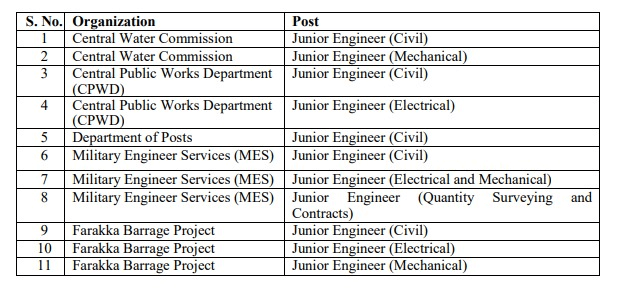
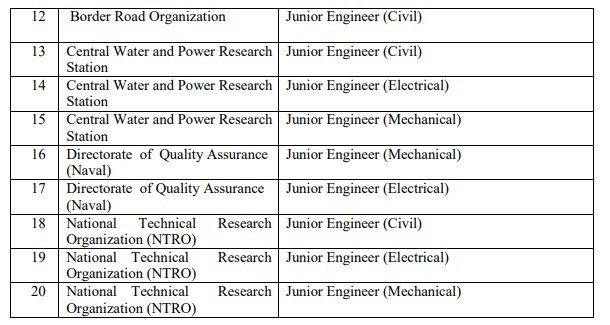
SSC GD - The General Duty Exam is also known as GD
Almost annually the Staff Selection Commission (SSC) holds the SSC GD examination to hire applicants for the posts of Constable or in other words for General Duty in the Border Security Forces (BSF), Central Reserve Police Forces (CRPF); Indo Tibetan Border Police (ITBP) and so on.
The selection for these positions is carried out in accordance with the Memorandum of Understanding (MoU) through mutual consent between the Staff Selection Commission and the Ministry of Home Affairs.
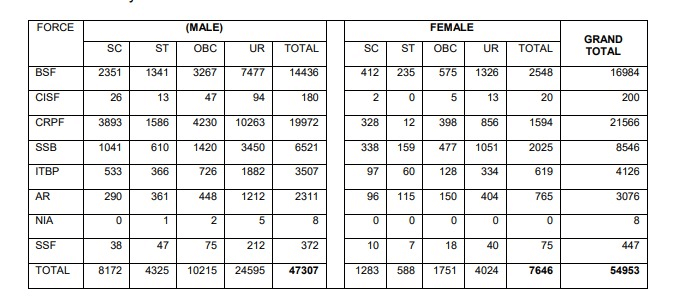
SSC Stenographer
SSC Stenographer is an exam is utilized to recruitapplicants for the posts underStenographer Grade C which is a non-gazetted position along with Grade D posts in the several departments, sections ministries, and organisations of Govt of India. SSC organizes, annually this exam which is at an all India level. This post also includes a typing test- with a minimum typing speed of 45-60 words per minute.
The stenographer can be in Hindi language or English language.
SSC MTS
The Staff Selection Commission examination for Multi-Tasking Staff is abbreviated as SSC MTS. The SSC recruits Multitasking Staff for positions in several ministry, and offices of the Central Government of India.
Salary, Perks, Incentives for SSC Employees
- SSC is the most well-known governmental body that organizes examinations for graduates or 12th-grade students.
- Because there are no restrictions on stream knowledge, anyone from any stream can enroll for this test. As a result, the competition is quite intense.
- Following the seventh pay commission, the SSC remuneration ranges from Rs. 18000 to Rs. 250000 (with incentives), based on the category and job profile.
- CGL has five pay bands: Level 8, Level 7, Level 6, Level 5, and Level 4. The cumulative SSC CGL pay or salary for each post ranges between Rs 25,500 to Rs 1,51,100, depending on the pay level.
- Allowances and benefits offered to SSC CGL employees include House Rent Allowance (HRA) and Dearness Allowance and travel allowance or TA.
- Apart from this, SSC employees also get the benefit of the CGHS scheme or Central Government Health Scheme. Depending on the pay band, they get the medical facilities, and almost all the treatment of SSC employees and their families is taken care of by CGHS.
- Apart from this, Defense employees get the facility of defense canteen; Railway employees get the facility of train tickets and so on.
- SSC offers immense opportunities for the students. With hard work, dedication, and effort, one can pass this exam.